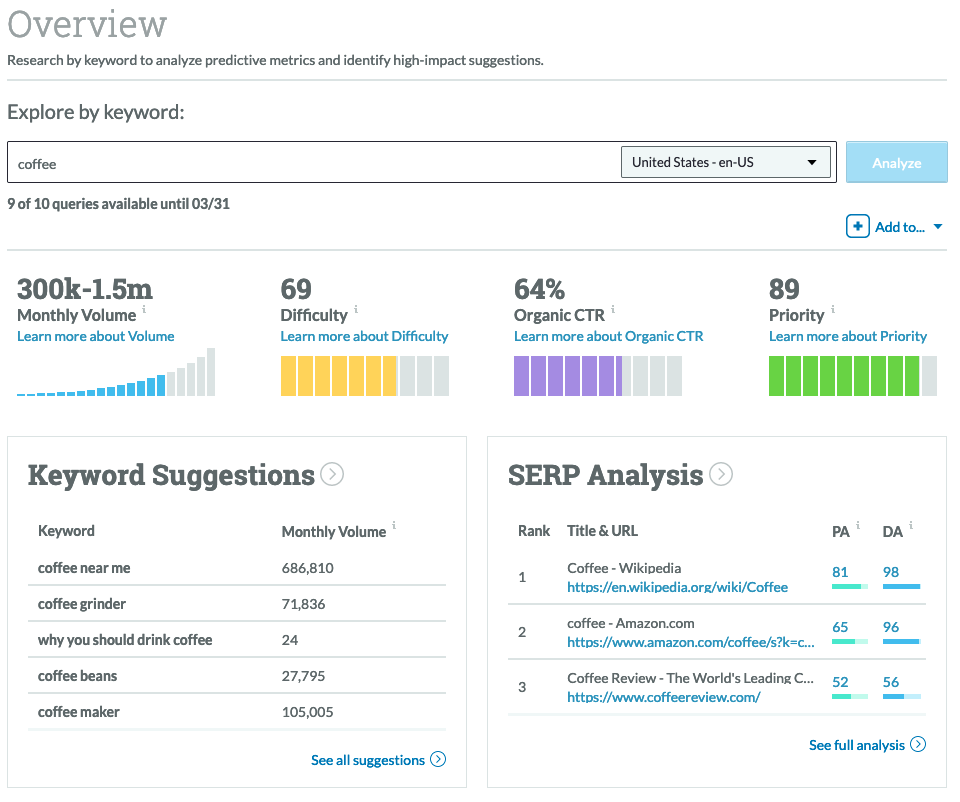Ready to improve your ranking on Google? If so, it’s important to choose SEO keywords. Picking smart SEO keywords will attract people who are looking for your service or products.
When choosing your keywords, there are many factors you need to take into account. What words are in high demand? How often do people search for those words each month? How competitive are the top results for those terms?
Below we’ve outlined some great tips and tools which can help with this process.
(And if you’re looking for even more SEO tips, check out our guide to Squarespace SEO.)
What are SEO keywords?
First off, know that “keywords” are usually not individual words. Instead, the term “keyword” can refer to a full phrase.
Head keywords are usually single words, such as “clothing” or “restaurant.” As you might imagine, they can be extremely competitive for search engine ranks. You may want your new cafe to rank for the term “coffee,” but it’s hard to compete with Starbucks and Peets.
Long-tail keywords are longer phrases, typically with much less competition. It’s much easier to rank for search phrases such as “new italian restaurant monterey california” or “best place to order organic coffee online.”
How to find SEO Keywords
Always think from the perspective of your ideal website visitor. Pick keywords to help visitors to useful content by asking yourself: What are they looking for on your website? What problem can you solve for them? Is your content relevant to their search?
Give each webpage one goal. Think about what each page absolutely must do to be successful — whether that’s directing visitors to your new webinar or collecting emails for your newsletter list. Your keywords should help fulfill the specific goal of each page.
Use hyperspecific keywords. For example, it’s better to target a specific niche and location such as “vegan event catering brooklyn” rather than generic terms like “vegan food” and “catering”. These kinds of keywords can be much easier to rank for, and they are a good way to get noticed if your website content is relevant and high quality.
Think about which keywords will fit easily in your content. You want to write naturally and avoid “keyword stuffing,” trying to cram as many keywords into content as possible. Write for a human reader, and sprinkle in keywords as appropriate.
Tools to Choose SEO Keywords
Free Tools (No Account Required):
Google Trends. Shows trending topics and related searches on Google. By default, will limit results to the past 12 months and within the USA. Be sure you set the location to match your target audience.
Answer The Public. Enter your keywords and see a visualization of related searches, phrases, and questions from Google searches. A great way to think of blog topics based on actual search terms.
Example of searching the keyword “coffee” on Answer The Public.
Free Tools (Account Required):
Google Keyword Planner. Helpful for more in-depth search results and analysis, but does require an Adwords account. Note that you don’t actually have to pay for Adwords, however.
Moz Keyword Explorer. Moz is a classic in the SEO world, and for good reason. You have to create an account to use their keyword research tool, but it’s well worth the hassle. Among other factors, MOZ shows monthly search volume, difficulty of ranking, and keyword suggestions.

Paid Tools:
Spyfu. This tool is best if you know your competition. Spyfu reveals where others rank, plus their keywords and Google ads. This does not excuse you from doing your own research! But it is helpful if you want to see what others are doing, so you can do even better.
RankMath SEO. A plugin that helps you identify keywords and optimize website content. The free version of their SEO is a good place to start, and it’s worth upgrading to their paid plan.
Interested in trying a premium SEO tool? My WordPress hosting plans and WordPress care plans include complimentary premium licenses.







